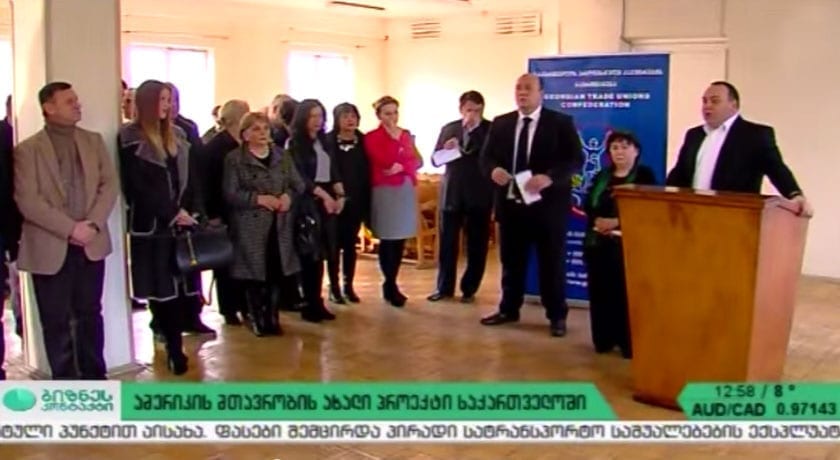
Mar 9, 2015
A new Solidarity Center project in Georgia to strengthen respect for worker rights through union, government and employer engagement will ensure the voice of workers is “a critical part of policymaking” so that “the benefits of economic growth are shared,” says Solidarity Center Executive Director Shawna Bader-Blau.
The Georgian Minister of Labor, U.S. and Georgian government officials, diplomats, nongovernmental organization (NGO) representatives and leaders of the Georgian Trade Union Confederation (GTUC) launched the three-year venture, Strengthening Worker Organizations in Georgia, on March 4 in Tbilisi, the country’s capital. The project is funded by the U.S. Department of Labor and will be implemented by the Solidarity Center in cooperation with the GTUC.
The project focuses on improving worker occupational safety and health. Some 273 workers have been killed on the job in the past six years, and many more seriously injured, likely draining Georgia’s ability to boost its stagnant gross domestic product (GDP). Key elements of the project include increasing GTUC job safety and health inspectors and expanding the number of joint union-management occupational safety and health committees.
In addition, the project involves training workers in negotiating contracts and broadening unions’ ability to promote effective labor law enforcement.
Speaking at the launch, GTUC President Irakli Petriashvili said, “It is very important that the international community keep an eye on any violations aimed at employees.”
“Ultimately, the project, which will build on recent improvements in Georgian labor law, will lead to greater compliance with national labor law and internationally recognized norms and standards,” including the right to form unions, says Stanislaw Cieniuch, Solidarity Center Georgia program director. “Over time, these and other measures will contribute to building a modern, cooperative system of labor-management relations.”
The city’s metro transportation hub, the site of the launch event, was chosen because it is a workplace “where workers and employers have come together in a commitment to decent, safe and productive employment—through collective bargaining,” says Bader-Blau.

Mar 6, 2015
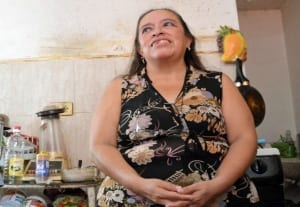
Tonantzin Nava: “As women, we must raise our voices and keep pushing for better opportunities for all of us.”
At an auto parts factory in Piedras Negras, Mexico, women getting off work after midnight board private buses the company pays for to transport them home. But until recently, the bus drivers refused to take the women all the way to their houses, instead letting them off far from their residences and forcing them to walk alone in one of Mexico’s most unsafe areas, especially for women. (El articulo en español aquÍ.)
All that changed after the women joined together and circulated a petition asking their employer to require the bus drivers to take them to their houses, which they now do.
“To me this was important not only because now we can say to our kids that we’ll be back from work safe at night, but also because more women in our neighborhoods will consider working at the factories,” says one worker, Tonantzin Nava. “As women, we must raise our voices and keep pushing for better opportunities for all of us, and to ensure that our jobs provide for our safety.”
The women workers recognized they have the power to stand up for their safety after participating in the Gender and Women’s Empowerment for Action (GEMA) training, a program sponsored by the Solidarity Center and the Border Committee of Women Workers (Comité Fronterizo de Obrer@s, CFO).
Launched in 2013, GEMA (“gemstone” in Spanish), is unique because women workers are at its center. It was designed by and for women workers in the maquilas of Mexico’s northern border, and the workers guide the program facilitators in the types of training, analysis and planning most appropriate and useful for them. GEMA participants tell facilitators they want formal-sector jobs, but with decent working conditions. If maquila jobs—where women predominate—are not decent jobs, they perpetuate gender-based discrimination and violence and do not help families and their communities.
Economic hardship contributes to the daily potential for physical danger, and accentuates the risks that women in particular face. The GEMA program helps women analyze these issues and develop plans of action to address them.
In border areas like Piedras Negras, women make around $1 per hour in the maquiladoras, and most face unsafe and unhealthy conditions in an environment where labor laws are typically not enforced. Chronic injuries such as carpel tunnel and circulation problems from long hours of backbreaking and repetitive work are the norm, yet access to health care and workers’ compensation is sporadic.
Piedras Negras, in Coahuila state, across from Eagle Pass, Texas, is in the heart of northeastern Mexico, where the number of women murdered jumped more than 500 percent between 2001 and 2010. While the cause of these deaths varies, the deterioration of the social fabric, which has enabled such violence to surge unimpeded, stems in large part from the economic marginalization of women and their families.
Across Mexico, some 4,000 women disappeared in 2011–2012, part of a pandemic of violence against women at a time when 10 million workers were unable to provide the basic needs of their families, and when the number of women entering precarious jobs grew faster than the rate at which they were entering well-paid formal sector jobs.
To reach and empower as many women as possible, GEMA participants go on to share their insights and training with other women, meeting with them in their homes, where these “safe” environments provide them the social space to get to know one another and develop bonds of solidarity, figure out their most pressing problems and devise courses of action to address them. The women say GEMA gives them the tools to rebuild the social fabric of their communities.
“In GEMA, we have developed our self-confidence as well as skills and talents that we didn´t even know we had,” says Yohanna Esparza. “I am now facilitating discussion groups with other women and we are starting to walk steadfastly together, with our heads held high, on the path toward our dreams of a better future.”
Other women who have taken part in GEMA have gone on to participate in weekly roundtable meetings with management at an auto parts factory, to channel concerns and develop solutions.
GEMA is now expanding its reach. In 2014, the CFO and Solidarity Center began jointly facilitating a women’s empowerment and leadership program for women mineworkers with the National Union of Mine, Metal, Steel and Similar Workers of the Mexican Republic (SNTMMSSRM) and United Steelworkers. The union leadership is unanimous in declaring that when women are strong, and make their voices heard, unions are strong and everyone benefits from improved living and working conditions—workers, employers and society.
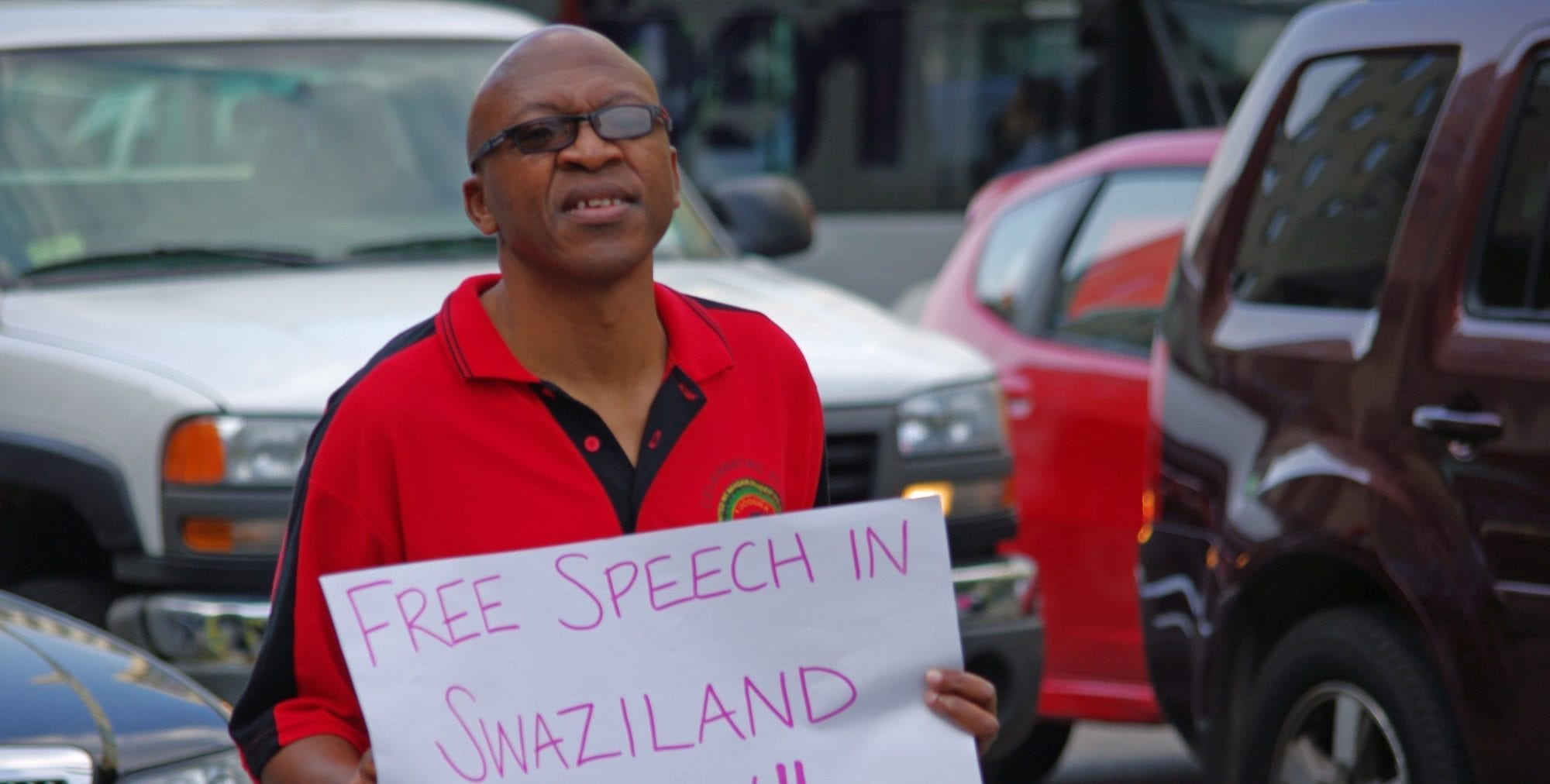
Mar 3, 2015
Accusing workers of discussing democracy, Swazi police broke up a national union meeting over the weekend in Manzini, according to Trade Union Congress of Swaziland (TUCOSWA) Secretary-General Vincent Ncongwane.
“The police said they would crush our meeting if we do not remove any discussion on multiparty democracy because according to the police, and their supervisors, that is not a workers’ agenda,” Ncongwane told Radio France Internationale. “And we said we are not going to remove that.”
Ncongwane said more than 100 police were at the site, and they erected roadblocks to prevent TUCOSWA members from entering the building. When union leaders cited the country’s constitution as allowing freedom of assembly, the police “said to us we are not going to be bothered about us quoting sections of the law,” Ncongwane recounted. “They are going to be interested in applying their discretion.”
The police action is the latest move against worker and human rights in Swaziland. Swaziland authorities continue their nearly three-year refusal to grant legal registration to TUCOSWA, despite the federation making another application in December 2014 under the country’s recently amended Industrial Relations Act. In August 2014, some in the Swazi government falsely accused Ncongwane and human rights lawyer Sipho Gumedze of taking a stand against trade benefits for Swaziland when they were in Washington, D.C., to attend the U.S. Africa Leaders Summit Civil Society Forum.
Earlier in June 2014 the U.S. took the rare step of suspending African Growth and Opportunity Act (AGOA) trade benefits for Swaziland, citing the Swazi government’s systematic violations of fundamental worker rights, including refusal to legally recognize TUCOSWA. Swaziland’s trade unions support AGOA, but maintain that the country must meet benchmarks of the agreement, which include respecting human rights and labor rights.
The 2014 U.S. State Department human rights report cited serious human rights violations in Swaziland, including arbitrary or unlawful killings by the government or its agents; severely restricted freedom of assembly, including violence against protestors; jailing of trade union leaders; the deregistration of TUCOSWA and the banning of strikes.
AGOA had been on the union’s meeting agenda. Garment workers, 90 percent of whom are women, have been especially hard hit. Ncongwane noted that the loss of AGOA has cost many jobs, with 2,000 garment workers already laid off. “We think that there’s going to be a flood of workers that are going to lose jobs just because of the loss of AGOA.”
In addition to non-registration of TUCOSWA and AGOA, trade union leaders also had planned to discuss the increasing casualization of labor, in which more and more workers getting hired on three month-contracts that provide no job stability or living wages. Ncongwane said these issues will be on the agenda for the union’s next meeting, March 14, a date that coincides with the TUCOSWA’s creation in 2012.
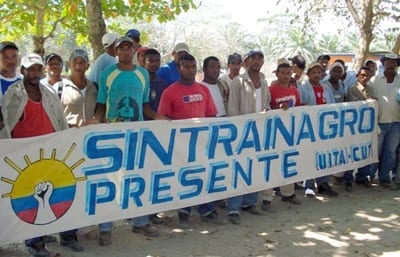
Mar 2, 2015
Gunmen fired on a car carrying Guillermo Rivera and Medardo Cuesta, president and treasurer, respectively, of the Colombian rural workers union SINTRAINAGRO, as they were meeting February 24 with members in Valle del Cauca.
Their vehicle was hit by bullets but the two were unharmed thanks to the reaction of Cuesta’s bodyguard. The National Protection Unit has recently denied Rivera’s requests for protection, citing lack of resources. Cuesta was granted protection while visiting the high-risk Valle del Cauca, but union leaders must be able to safely travel the entire country. The International Union of Food, Agricultural, Hotel, Restaurant, Catering, Tobacco and Allied Workers’ Associations (IUF) has written the Colombian authorities to denounce the attack and again demand adequate protection for threatened union leaders.
SINTRAINAGRO, which organizes banana, palm oil, sugar and flower workers, has had some 750 members and leaders murdered by paramilitary organizations over past decades. The union has expressed support for the ongoing peace negotiations between the government and the rebel group, FARC, but also insists on an end to the decades of impunity for those responsible for years of systematic violence against the labor movement.
This is a crosspost from IUF.

Mar 1, 2015
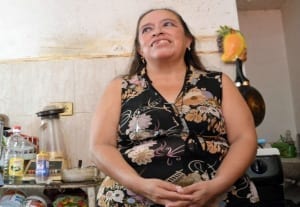
Tonantzin Nava: “Como mujeres, debemos levantar nuestras voces y seguir luchando por mejores oportunidades para todas nosotras de.”
En una fábrica de piezas de automóviles en Piedras Negras, México, las mujeres salen del trabajo después de la medianoche a tomar los autobuses privados que la empresa paga para transportarlas de regreso a casa. Pero hasta hace poco, los conductores de autobuses se negaban a llevar a las mujeres todo el camino de regreso hasta sus casas, en vez las dejaban lejos de sus residencias obligándolas a caminar solo en una de las zonas más inseguras de México, especialmente para las mujeres.
Todo eso cambió después de que las mujeres se unieron y circularon una petición pidiendo a su empleador que exigiera a los conductores de autobuses llevarlas a sus casas, lo que lo hacen ahora.
“Para mí fue importante no sólo porque ahora podemos decir a nuestros hijos que regresaremos seguras del trabajo por la noche, sino también porque más mujeres en nuestros barrios considerarán trabajar en las fábricas,” dijo una trabajadora, Tonantzin Nava. “Como mujeres debemos levantar nuestras voces y seguir luchando por mejores oportunidades para todas nosotras de, y también asegurar que nuestros trabajos nos proporcionan seguridad. ”
Las trabajadoras reconocieron que tienen el poder para defender su seguridad después de participar en la formación de Género y Empoderamiento de las Mujeres para la Acción (GEMA), un programa patrocinado por el Centro de Solidaridad y el Comité Fronterizo de Obreras (Comité Fronterizo de Obrer@s, CFO) que permite a las mujeres a encontrar sus voces como defensoras de base de los derechos laborales y humanos.
Lanzado en 2013, GEMA, es un programa único porque las trabajadoras están al centro de dicho programa. Fue diseñado por y para las trabajadoras en las maquilas de la frontera norte de México; las propias trabajadoras guían a las facilitadoras del programa con respecto a cuál es el tipo más adecuado de formación, análisis y planificación que es útil para ellas. Lo que las mujeres GEMA dicen a las facilitadoras es que quieren empleos del sector formal pero con condiciones dignas. Si los trabajos de maquila–donde predominan las mujeres – no son empleos decentes, terminan perpetuando la discriminación y la violencia por motivos de género en lugar de ayudar a las familias y sus comunidades.
Las dificultades económicas contribuyen al potencial diario para el peligro físico, y acentúa los riesgos que particularmente enfrentan las mujeres. El programa GEMA ayuda a las mujeres analizar estos temas y desarrollar planes de acción para hacer frente a ellos.
En ciudades fronterizas como Piedras Negras, las mujeres ganan aproximadamente US $1 por hora por su trabajo en las maquiladoras, y la mayoría enfrentan condiciones inseguras e insalubres en un ambiente en el cual las leyes laborales típicamente no se suelen cumplir. Las lesiones crónicas como túnel carpiano y problemas de la circulación sanguínea debido a largas horas de trabajo agotador y repetitivo son la norma, sin embargo, el acceso al seguro social.
Piedras Negras, en el estado de Coahuila, al otro lado de Eagle Pass, Texas, se encuentra en el corazón del noreste de México, donde el número de mujeres asesinadas aumentó más de 500 por ciento entre 2001 y 2010. Si bien la causa de estas muertes varia, el deterioro del tejido social, que ha permitido este tipo de violencia a surgir sin obstáculos, se deriva en gran parte por la marginación económica de las mujeres y sus familias.
Unas 4.000 mujeres desaparecieron en México en el período 2011-2012, parte de una pandemia de la violencia contra las mujeres en México; en un momento en el cual 10 millones de trabajadores fueron incapaces de satisfacer las necesidades básicas de sus familias, y el número de mujeres que entraban en empleos precarios creció más rápido que la velocidad a la que estaban entrando en empleos bien remunerados en el sector formal.
Con el fin de alcanzar y empoderar a tantas mujeres que les sea posible, las participantes GEMA comparten sus conocimientos y la formación con otras mujeres, se reúnen con ellas en sus casas en ambientes “seguros” que proporcionan el espacio social para llegar a conocerse unas a otras y desarrollar lazos de solidaridad, entender sus problemas más apremiantes y diseñar cursos de acción para hacer frente a ellos. Las mujeres dicen que GEMA les proporciona herramientas para reconstruir el tejido social de sus comunidades.
“En GEMA hemos desarrollado nuestra confianza en nosotras mismas, así como habilidades y talentos que incluso no sabíamos que teníamos,” dijo Yohanna Esparza. “Ahora estoy facilitando grupos de discusión con otras mujeres y ahora estamos empezando a caminar firmemente juntas, con la frente en alto, en el camino hacia nuestros sueños de un futuro mejor.”
Otras mujeres que han participado en GEMA han pasado a participar en reuniones de mesa redonda semanales organizadas por personal gerencial de una fábrica de autopartes para canalizar inquietudes y desarrollar soluciones.
El programa GEMA está en crecimiento. Desde 2014 el CFO y el Centro de Solidaridad también facilitan en forma conjunta un programa de empoderamiento y liderazgo de las mujeres para las mujeres mineras con el Sindicato Nacional de Trabajadores Mineros, Metalúrgicos, de acero y trabajadores similares de la República Mexicana (SNTMMSRM) y United Steelworkers. La dirigencia sindical es unánime al declarar que cuando las mujeres son fuertes, y hacer que sus voces sean escuchadas, los sindicatos son fuertes y todo el mundo se beneficia de la mejora de las condiciones de trabajo y de vida; los trabajadores, los empleadores y la sociedad en su conjunto.






